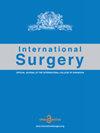肝切除术后并发症对肝癌患者长期生存的影响
IF 0.2
4区 医学
Q4 SURGERY
引用次数: 0
摘要
目的肝细胞癌(HCC)术后并发症包括红细胞输注(BT)对远期生存率的影响尚不清楚。本研究的目的是确定HCC患者术后并发症与长期生存率之间的关系。方法对1251例HCC根治性肝切除术后并发症进行分类,并对其无复发生存率(RFS)和累计总生存率(OS)进行调查。结果发生并发症503例(40%)。并发症组的5年RFS和5年OS分别为21%和56%,显著低于无并发症组的32%(p<0.001)和68%(p<0.001)(n=748)。与RFS相关的并发症为术后BT[危险比(HR):1.726,95%置信区间(CI):1.338-2.228,p<0.001],胸腔积液[HR:1.434,95%CI:1.2000-1.713,p<0.001]。与OS相关的并发症有术后BT[HR:1.843,95%CI:1.380-2.462,p<0.001],腹水[HR:1.562,95%CI:1.066-2.290 p=0.022],和胸腔积液[HR:1.421,95%CI:1.150-1.755,p=0.001)。结论术后并发症是长期生存率低的相关因素。术后BT和胸腔积液是显著的并发症,是无复发生存率和总生存率的预后因素。本文章由计算机程序翻译,如有差异,请以英文原文为准。
Impact of postoperative complications on long-term survival of hepatocellular carcinoma patients after liver resection
Objective The effect of postoperative complications including red blood transfusion (BT) on long-term survival for hepatocellular carcinoma (HCC) is unknown. The purpose of this study was to define the relationship between postoperative complications and long-term survival in patients with HCC. Methods Postoperative complications of 1251 patients who underwent curative liver resection for HCC were classified, and their recurrence-free survival (RFS) and cumulative overall survival (OS) were investigated. Results Any complications occurred in 503 patients (40%). Five-year RFS and 5-year OS in the complication group were 21% and 56%, respectively, significantly lower than the respective values of 32% ( p < 0.001) and 68% ( p < 0.001) in the no-complication group (n=748). Complications related to RFS were postoperative BT [Hazard ratio (HR): 1.726, 95% confidence interval (CI): 1.338–2.228, p < 0.001], pleural effusion [HR: 1.434, 95% CI: 1.200–1.713, p < 0.001] using Cox-proportional hazard model. Complications related to OS were postoperative BT [HR: 1.843, 95%CI: 1.380-2.462, p < 0.001], ascites [HR: 1.562, 95% CI: 1.066–2.290 p = 0.022], and pleural effusion [HR: 1.421, 95% CI: 1.150–1.755, p = 0.001). Conclusions Postoperative complications were factors associated with poor long-term survival. Postoperative BT and pleural effusion, were noticeable complications that were prognostic factors for both recurrence-free survival and overall survival.
求助全文
通过发布文献求助,成功后即可免费获取论文全文。
去求助
来源期刊

International surgery
医学-外科
CiteScore
0.30
自引率
0.00%
发文量
10
审稿时长
6-12 weeks
期刊介绍:
International Surgery is the Official Journal of the International College of Surgeons. International Surgery has been published since 1938 and has an important position in the global scientific and medical publishing field.
The Journal publishes only open access manuscripts. Advantages and benefits of open access publishing in International Surgery include:
-worldwide internet transmission
-prompt peer reviews
-timely publishing following peer review approved manuscripts
-even more timely worldwide transmissions of unedited peer review approved manuscripts (“online first”) prior to having copy edited manuscripts formally published.
Non-approved peer reviewed manuscript authors have the opportunity to update and improve manuscripts prior to again submitting for peer review.
 求助内容:
求助内容: 应助结果提醒方式:
应助结果提醒方式:


